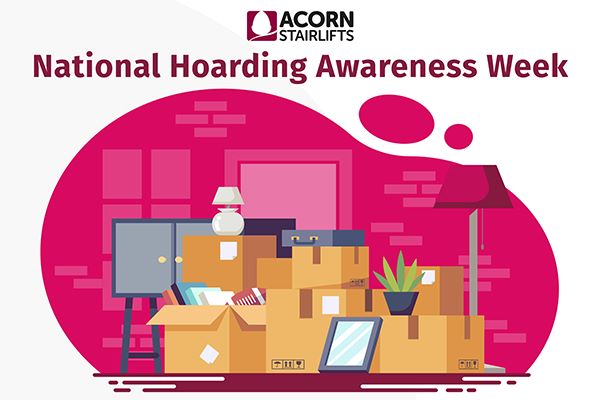Do you ever feel consumed by chaos and clutter—like you’re drowning in your own disarray?
As it turns out, you’re not the only one.
According to a survey, 56 percent of Brits have rooms that are unusable because of clutter.
In fact, research suggests that as much as 5 percent of people in the UK struggle with hoarding, a more serious disorder in which the mess can quite literally spiral out of control and take over someone’s life—Although researchers believe that, in reality, these numbers may be way higher due to the underreporting of hoarding from shame or fear of judgement from others.
With so many people coming clean about their clutter being out of control, this National Hoarding Awareness Week, let’s destigmitise this disorder by delving into the complex phenomenon of hoarding, five key reasons why people hoard, and how you can provide support and assistance to those affected by this challenging condition.
What is Hoarding Disorder?
Hoarding disorder is a mental health condition characterised by persistent difficulty in discarding or parting with possessions, regardless of their actual value.
People with hoarding disorder experience a strong urge to save items and become distressed at the thought of getting rid of them.
This results in the excessive accumulation of possessions, leading to cluttered living spaces that can compromise the intended use of the home and the person’s safety and “distress of significant impairment in personal, family, social, educational, occupational, or other important areas of functioning.”
What Are Some Signs and Behaviours Associated with Hoarders?
Unfortunately, because hoarding tends to be so stigmatised in our society, people who suffer from this disorder may feel ashamed and try to hide their struggles from their loved ones out of fear of judgement.
However, if you suspect that your loved one may be a hoarder, here are some significant signs and behaviours that you should be monitoring and paying close attention to:
- They become extremely attached to items, even refusing to let anyone touch or borrow them
- They find it difficult to get rid of the things they own, regardless of the value of the items
- They are constantly bringing in and keeping more possessions that they don’t need or have the space for
- They feel emotionally distressed at the thought of getting rid of their things, feeling the need to save everything
- They can’t use parts of their home due to excessive clutter
- They struggle to make decisions or delay making them
- They have perfectionist tendencies
- They struggle to caregorise or organise items
- They struggle to manage everyday tasks such as paying bills, cooking, or cleaning
- They have poor relationships with family or friends
5 Key Reasons Why People May Develop Hoarding Disorder
1. Unprocessed Trauma and Feelings
Unprocessed trauma and feelings can lead to hoarding because the act of collecting and saving items can create a sense of safety and control in an otherwise emotionally chaotic environment.
Additionally, the possessions may serve as physical reminders of significant experiences or people, making it emotionally difficult to discard them.
2. Stressful Life Events
Stressful life events such as a death in the family, divorces, or health complications can lead to hoarding, as individuals may start accumulating items as a way to cope with and regain a sense of control during turbulent times.
These possessions may provide emotional comfort and a perceived safeguard against future uncertainties, making it difficult for the person to discard them.
3. Other Mental Disorders
Other mental disorders, such as depression and anxiety, can lead to hoarding because they may impair an individual's ability to make decisions and manage possessions effectively.
Additionally, conditions like obsessive-compulsive disorder (OCD) can intensify the urge to save items and create distress around discarding them, contributing to hoarding behaviours.
4. Family History and Habits
Family history and habits can lead to hoarding because growing up in a household where hoarding behaviour is present can normalise the accumulation of items and difficulty discarding them.
Furthermore, genetic factors may predispose individuals to develop similar behaviours, as traits related to hoarding can be inherited.
5. Certain Personality Traits Such as Perfectionism
Certain personality traits, such as perfectionism or indecisiveness can lead to hoarding because individuals may fear making the wrong decision about what to keep or discard, causing them to hold onto items excessively.
For example, perfectionistic tendencies can drive people to believe that each possession has unique importance or to fear that they could make a “mistake” by throwing away something that they may need, making it difficult to part with anything.
How to Get Help for Hoarders
Sadly, according to Hoarding UK, only 5 percent of hoarders come to the attention of professionals who can help them overcome their struggles.
However, you can help destimatise hoarding and support your loved ones by helping them receive the professional care that they need.
If you suspect that your loved one is a hoarder, the first step is to approach them with empathy and understanding, avoiding judgmental language.
Remember—Your loved one may not believe they have a problem. Be as gentle and kind as possible.
Encourage them to seek help from a mental health professional who specialises in hoarding disorder and can provide cognitive behavioural therapy (CBT).
You can also assist in finding support groups where they can connect with others facing similar challenges, feeling less alone and less ashamed in their struggles.
Beyond working on the psychological root of their disorder, you can simultaneously help them tackle the physical mess by involving professional organisers and social services to help manage the clutter safely and effectively.
Throughout the process, provide ongoing emotional support and patience as they work towards overcoming hoarding behaviours.
For more information and resources on how to help someone with a hoarding disorder, click here.
